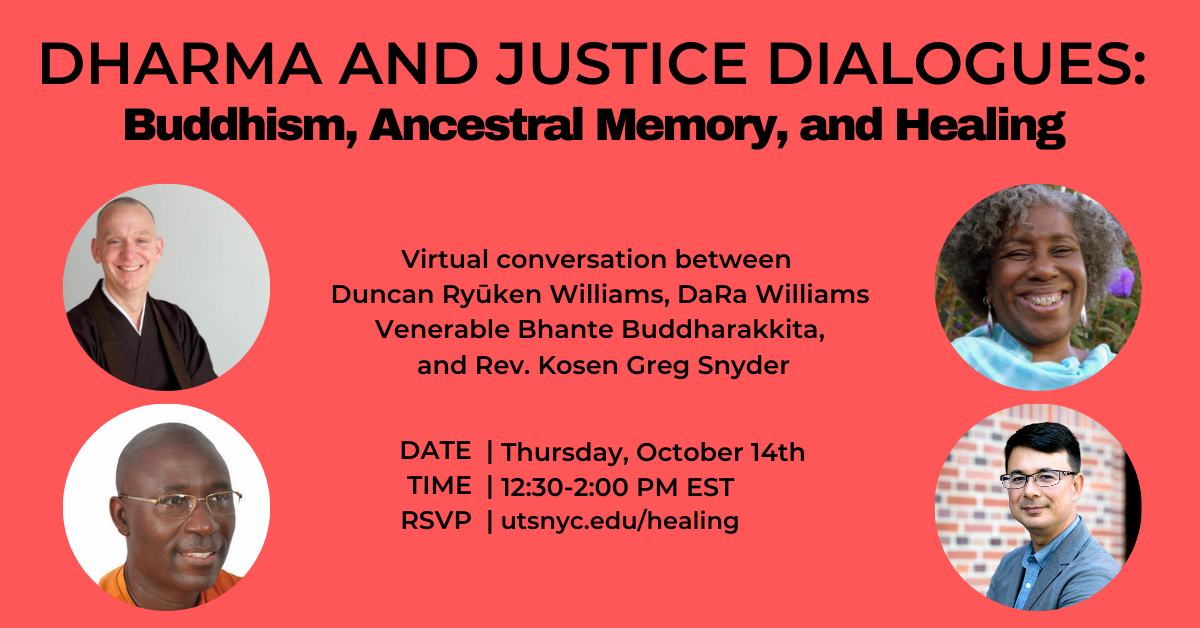Dharma and Justice Dialogues: Buddhism, Ancestral Memory, and Healing
Join us for Dharma and Justice: Buddhism, Ancestral Memory, and Healing with Duncan Ryūken Williams, Venerable Bhante Buddharakkita, DaRa Williams, and Kosen Gregory Snyder. This online event will take place on Thursday, October 14, from 12:30 pm – 2 pm ET. Click here to register for the webinar.
For some traditions of Buddhism, ancestral lineage offers a precious spiritual place for devotion, wisdom, and a deep sense of origin. As Buddhism continues to unfold in the United States within and beyond the Asian communities in which it came, all complex, painful, and cherished relationships to ancestry and ancestors unfold with it.
Historically, these same lineages have often been constructed for reasons of legitimacy, authority, power, and attracting resources. The legacy of white supremacist colonization has severed ancestries through violent occupation, relocation, reeducation, and enslavement. The logic of whiteness itself is one that insists our cultural and ancestral bodies be stripped, denounced, and replaced by ahistorical and racialized hierarchies of power. Ancestry, then, can for us bear a timeless love and encouragement or a deeply cutting domination and erasure. Our ancestors can be as close to our bodies as our very breath and they can be rendered the unnecessary, cultural baggage of less reasonable peoples.
How then do we morally navigate the many intersections of our personal and Buddhist ancestries so our views and actions cultivate healing and liberation for all beings, rather than furthering the harmful, colonial, supremacist legacies of our world and nation? As we unpack this question together, we are excited to learn from three people who have devoted their lives to working intimately at these very intersections.
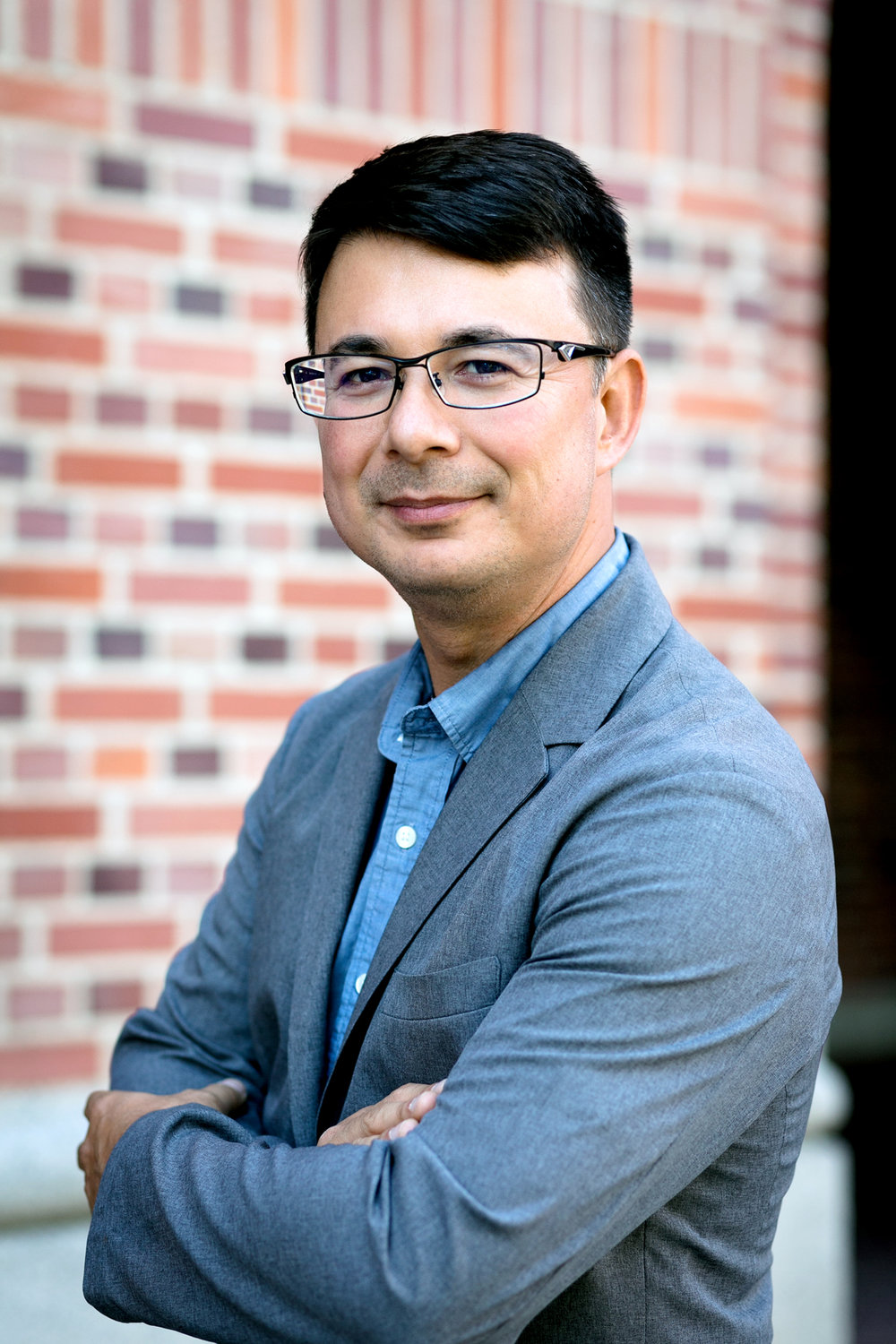 Duncan Ryūken Williams was ordained as a Soto Zen Buddhist priest at Kotakuji Temple (Nagano, Japan) in 1993 and then served as a Buddhist chaplain at Harvard University, where he received his Ph.D. in 2000. Currently, he is the Chair of the University of Southern California’s School of Religion, Professor of American Studies & Ethnicity, and Director of the USC Shinso Ito Center for Japanese Religions and Culture. Previously, he held the Ito Distinguished Chair of Japanese Buddhism at UC Berkeley and served as the Director of Berkeley’s Center for Japanese Studies. He is also the founder of Hapa Japan (a mixed race/mixed roots Japanese community and festival). Williams is the author of the LA Times bestseller American Sutra: A Story of Faith and Freedom in the Second World War (Harvard University Press, 2019) about Buddhism and the WWII Japanese American internment; The Other Side of Zen (Princeton University Press, 2005), and editor of 7 books centered on Buddhism as well as race, religion, and American belonging. He is a co-organizer of the “May We Gather” national Buddhist ceremony for Asian American ancestors, a gathering to heal the rising anti-Asian animus and violence of recent times. Williams is currently writing a book about a Buddhist approach to racial reparations and is the organizer of the USC Ito Center series “Black+Japanese American Reparations”.
Duncan Ryūken Williams was ordained as a Soto Zen Buddhist priest at Kotakuji Temple (Nagano, Japan) in 1993 and then served as a Buddhist chaplain at Harvard University, where he received his Ph.D. in 2000. Currently, he is the Chair of the University of Southern California’s School of Religion, Professor of American Studies & Ethnicity, and Director of the USC Shinso Ito Center for Japanese Religions and Culture. Previously, he held the Ito Distinguished Chair of Japanese Buddhism at UC Berkeley and served as the Director of Berkeley’s Center for Japanese Studies. He is also the founder of Hapa Japan (a mixed race/mixed roots Japanese community and festival). Williams is the author of the LA Times bestseller American Sutra: A Story of Faith and Freedom in the Second World War (Harvard University Press, 2019) about Buddhism and the WWII Japanese American internment; The Other Side of Zen (Princeton University Press, 2005), and editor of 7 books centered on Buddhism as well as race, religion, and American belonging. He is a co-organizer of the “May We Gather” national Buddhist ceremony for Asian American ancestors, a gathering to heal the rising anti-Asian animus and violence of recent times. Williams is currently writing a book about a Buddhist approach to racial reparations and is the organizer of the USC Ito Center series “Black+Japanese American Reparations”.
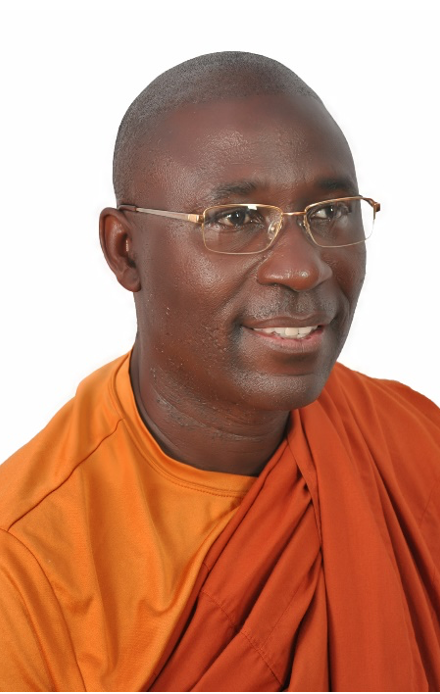
Venerable Bhante Buddharakkita was born in Uganda, Africa. He first encountered Buddhism in 1990 while studying and living in India. He was ordained as a Buddhist monk by the late Most Venerable U Silananda in 2002 at the Tathagata Meditation Center in San Jose, California. He then spent eight years under the guidance of Bhante Henepola Gunaratana at the Bhavana Society, West Virginia. He is the founder and Abbot of the Uganda Buddhist Center in Uganda.
Besides spending time at the Uganda Buddhist Center, he is a visiting professor at Union Theological Seminary in New York City and the spiritual director of Radiance Retreat Center in Magnolia, Mississippi. He is long-time member of Global Buddhist Relief’s advisory council in New Jersey.
He has been teaching mindfulness meditation in Africa, the U.S., and worldwide since 2005, and he is a much-loved teacher in many countries. His book, Planting Dhamma Seeds: The Emergence of Buddhism in Africa, tells the story of his religious and spiritual work in the continent of his birth.
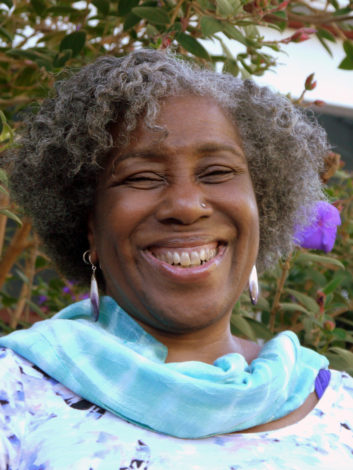 DaRa Williams is a meditation teacher, psychotherapist and trainer. DaRa has been a meditator for the past 25 years and is a practitioner of both Vipassana and Ascension meditation. She is a graduate of the Spirit Rock/Insight Meditation Society Teacher Training Program and is a Guiding Teacher at IMS. This year she completed the role of program manager and was a core teacher in the IMS Teacher Training Program. DaRa has been a clinician and administrator in the field of mental health for over 25 years and currently maintains a private teletherapy practice. She is a holder of Indigenous Focusing Oriented Therapy and Complex Trauma trainig in the USA and a certified trainer and practitioner of IFOT. She is committed to liberation and freedom thru integrating liberatory voices and knowledge. DaRa incorporates these practices, skills, understandings, wisdom traditions and world views in her intention for contributing to the ending of suffering for all beings.
DaRa Williams is a meditation teacher, psychotherapist and trainer. DaRa has been a meditator for the past 25 years and is a practitioner of both Vipassana and Ascension meditation. She is a graduate of the Spirit Rock/Insight Meditation Society Teacher Training Program and is a Guiding Teacher at IMS. This year she completed the role of program manager and was a core teacher in the IMS Teacher Training Program. DaRa has been a clinician and administrator in the field of mental health for over 25 years and currently maintains a private teletherapy practice. She is a holder of Indigenous Focusing Oriented Therapy and Complex Trauma trainig in the USA and a certified trainer and practitioner of IFOT. She is committed to liberation and freedom thru integrating liberatory voices and knowledge. DaRa incorporates these practices, skills, understandings, wisdom traditions and world views in her intention for contributing to the ending of suffering for all beings.
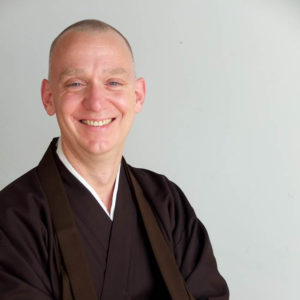
Kosen Gregory Snyder is the Senior Director and Assistant Professor of Buddhist Studies at Union Theological Seminary.
Professor Snyder is an ordained Zen Buddhist priest and dharma-transmitted teacher in the lineage of Shunryu Suzuki. He co-founded and is currently the senior resident priest at the Brooklyn Zen Center and Ancestral Heart Zen Monastery in Millerton, NY. He is one of the founders of the Buddhist Action Coalition, whose mission is to organize and inspire compassionate Buddhist initiatives in advancing social, economic, and environmental justice through advocacy and nonviolent direct action.
Professor Snyder’s academic and practice interests include socially engaged Buddhism, the intersections of contemplative interreligious dialogue and social action, the relationship between Buddhist liberatory practices and social transformation, and the exploratory juxtaposition of Buddhism with liberation theology, Earth-centered cosmologies, and Western continental theory, particularly phenomenology and post-structuralism. Professor Snyder is currently working on a book exploring expressions of social justice rooted in Buddhist dharma, moral epistemology, and praxis. He has been published in Buddhist and other periodicals, including Buddhadharma, Lion’s Roar, Shambhala Sun and the New York Times.

